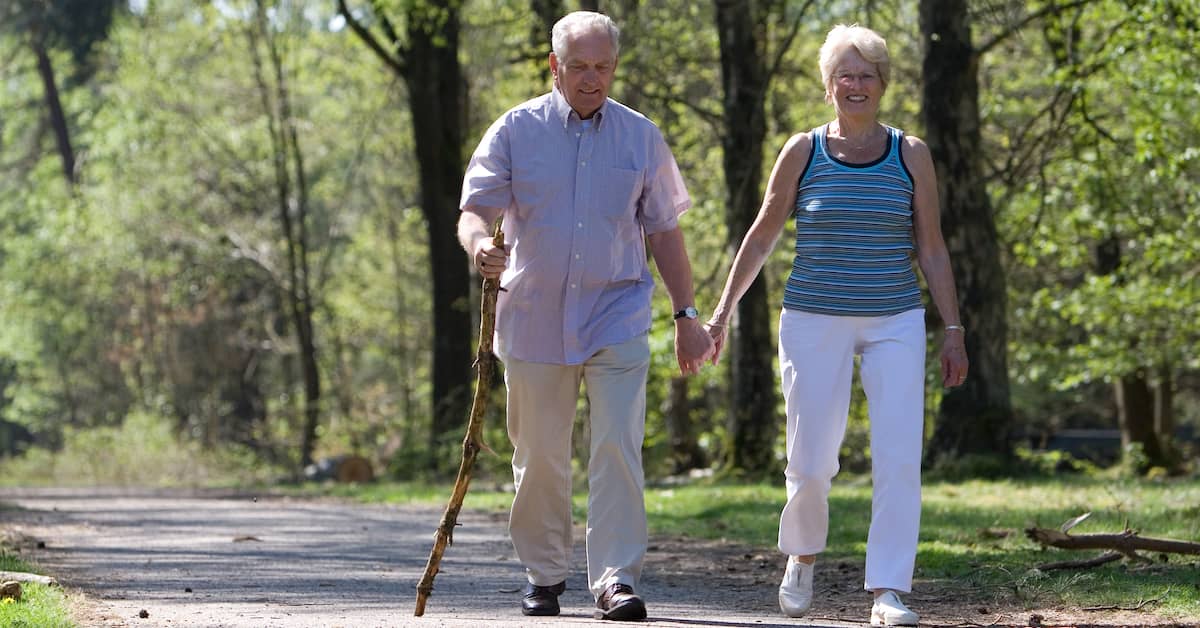
Don’t worry, I’m not referring to jogging; merely walking.
It seems too easy an activity to provide major health benefits, yet research keeps mounting to show that’s precisely what it's capable of.
Walking is a simple activity, accessible by people of all ages, and shown to confer many physical, mental, and social health benefits with minimal adverse effects.
Researchers at the University of Leicester, England, had previously shown that as little as ten minutes of brisk walking a day was "associated with longer life expectancy" among the British participants. Remarkably, brisk walkers enjoyed up to 20 years greater life expectancy compared to slow walkers.
Now they wanted to see if walking impacted the length of telomeres—those endcaps on DNA strands that protect them from shortening, and as a result, protect your cells from aging and your body from illness.
Why Telomeres Matter
Telomere length is now considered a strong genetic marker of biological age, or the age of body cells—sometimes called biological age. This is separate from a person’s chronological age, or age since birth.Shorter telomeres, which signify greater DNA damage, are linked to frailty and age-related diseases.
Employing strategies to slow telomere shrinkage with age are important if you want to remain healthy and add years to your life. The latest research confirms that brisk walking is one such strategy.
How to Become 16 Years Younger
For their new study, one of the first of its kind, the Leicester team analyzed data on 405,981 middle aged men and women who participated in the UK Biobank, a resource that's increasingly being utilized by research groups because of the wealth of medical, genetic and lifestyle information it contains.The team compared telomere data with self-reported walking speeds as well as measurements from a subset of those wearing accelerometers - tracking devices that measure physical activity and intensity.
The analysis showed that compared to slow walkers, steady/average and brisk walkers had significantly longer telomeres. In fact, brisk walking – more than four miles per hour - on its own, regardless of the total amount of physical activity a person performs, gave rise to longer telomeres, and, researcher say, could lead to being 16 years “younger” by midlife.
Dr. Paddy Dempsey, lead author on the study published in the journal Communications Biology in May, explained, saying, “This research uses genetic data to provide stronger evidence for a causal link between faster walking pace and longer telomere length. This suggests measures such as a habitually slower walking speed are a simple way of identifying people at greater risk of chronic disease or unhealthy aging…”
The value of walking for adding years to life is backed up by another new study, this time involving U.S. adults.
Saves Over 100,000 Lives a Year
Scientists from the National Cancer Institute (NCI) and Centers for Disease Control and Prevention (CDC) evaluated 4,840 adults aged 40 to 85 years who wore tracking devices to monitor MVPA, or moderate-to-vigorous physical activity intensity.The data revealed that increasing MVPA by ten, 20, or 30 minutes per day was associated with a 6.9 percent, 13.0 percent, and 16.9 percent decrease in the number of deaths per year, respectively.
Adding just ten minutes a day of physical activity resulted in an estimated 111,174 preventable deaths per year. Adding 20 minutes would save 209,459 lives. This rises to 272,297 for an extra 30 minutes.
In their paper, published in JAMA Internal Medicine in March, the scientists wrote, “To our knowledge this is the first study to estimate the number of preventable deaths through physical activity using accelerometer-based measurements among U.S. adults.
“These findings support implementing evidence-based strategies to improve physical activity for adults and potentially reduce deaths in the U.S.”
My Takeaway
If you’re a long-time reader of this publication, then you know that I’m a big fan of walking and count it as key to maintaining my physical fitness.I encourage you to join me. Do yourself a favor and add years to your life by putting on your walking shoes for a short period every day. Once you get moving, you’ll find that the physical benefits you’ll receive will help motivate you to add a regular walk to your daily exercise routine.
